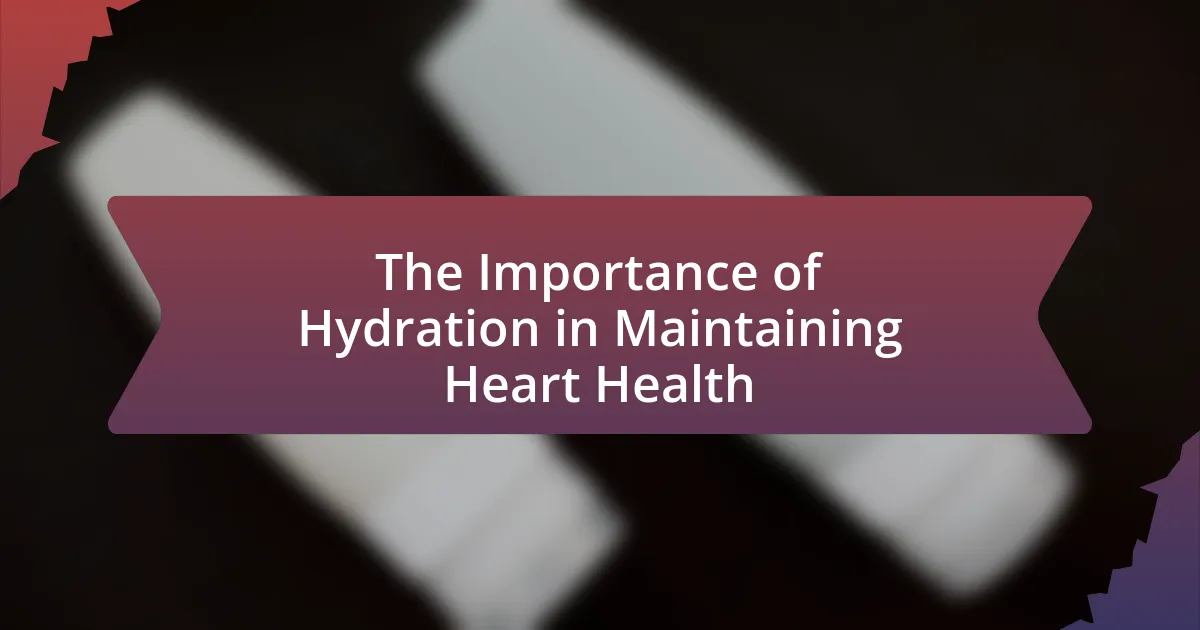The article focuses on heart health for women, highlighting unique risks and prevention strategies. It outlines how hormonal changes, particularly during menopause, increase the likelihood of heart disease, and discusses the impact of pregnancy-related conditions on long-term cardiovascular health. The article also examines lifestyle factors, such as diet, physical activity, and stress management, that contribute to heart disease in women. Additionally, it emphasizes the importance of recognizing atypical heart disease symptoms in women and provides practical tips for maintaining heart health, including regular health screenings and adopting heart-healthy habits.

What are the unique heart health risks for women?
Women face unique heart health risks, including higher susceptibility to conditions like coronary artery disease, particularly after menopause due to hormonal changes. Additionally, women are more likely to experience heart attack symptoms that differ from the classic signs, often leading to misdiagnosis. Factors such as pregnancy complications, including gestational diabetes and preeclampsia, also elevate long-term heart disease risk. Research indicates that women with a history of these conditions have a significantly increased likelihood of developing cardiovascular issues later in life. Furthermore, autoimmune diseases, which are more prevalent in women, can also contribute to heart health risks.
How do hormonal changes affect women’s heart health?
Hormonal changes significantly affect women’s heart health by influencing cardiovascular risk factors such as blood pressure, cholesterol levels, and vascular function. For instance, estrogen has a protective effect on the cardiovascular system, helping to maintain healthy blood vessels and regulate cholesterol levels. During menopause, the decline in estrogen levels is associated with an increased risk of heart disease, as studies indicate that postmenopausal women experience a higher incidence of hypertension and dyslipidemia. Research published in the Journal of the American College of Cardiology highlights that women who undergo early menopause have a 50% higher risk of cardiovascular disease compared to those who experience menopause later. This evidence underscores the critical role hormonal fluctuations play in shaping women’s cardiovascular health throughout their lives.
What role does menopause play in heart disease risk?
Menopause significantly increases the risk of heart disease in women. This heightened risk is primarily due to the decline in estrogen levels, which plays a protective role in cardiovascular health. Research indicates that postmenopausal women experience a higher incidence of atherosclerosis, hypertension, and other cardiovascular conditions compared to their premenopausal counterparts. For instance, a study published in the Journal of the American College of Cardiology found that the risk of coronary heart disease increases by approximately 1.5 to 2 times after menopause. This evidence underscores the critical role menopause plays in elevating heart disease risk among women.
How do pregnancy-related conditions impact long-term heart health?
Pregnancy-related conditions such as gestational hypertension, preeclampsia, and gestational diabetes significantly increase the risk of long-term heart health issues. Research indicates that women who experience these conditions are more likely to develop cardiovascular diseases later in life. For instance, a study published in the Journal of the American College of Cardiology found that women with a history of preeclampsia have a 2-4 times higher risk of developing heart disease compared to those without such a history. Additionally, gestational diabetes has been linked to an increased risk of type 2 diabetes and cardiovascular problems, with a study in the American Journal of Obstetrics and Gynecology showing that women with gestational diabetes have a 7-fold increased risk of developing heart disease. These findings underscore the importance of monitoring heart health in women with a history of pregnancy-related conditions.
What lifestyle factors contribute to heart disease in women?
Lifestyle factors that contribute to heart disease in women include poor diet, physical inactivity, smoking, and excessive alcohol consumption. A diet high in saturated fats, trans fats, and sodium can lead to obesity and high cholesterol, both of which are significant risk factors for heart disease. Physical inactivity increases the likelihood of obesity and hypertension, while smoking damages blood vessels and reduces oxygen in the blood. Excessive alcohol intake can lead to high blood pressure and irregular heartbeats. According to the American Heart Association, women who smoke are 25% more likely to develop heart disease compared to non-smokers, highlighting the critical impact of these lifestyle choices on heart health.
How does stress influence heart health in women?
Stress negatively influences heart health in women by increasing the risk of cardiovascular diseases. Chronic stress can lead to elevated blood pressure, increased heart rate, and the release of stress hormones like cortisol, which contribute to inflammation and arterial damage. Research indicates that women experiencing high levels of stress are more likely to develop heart disease compared to their male counterparts, as evidenced by a study published in the Journal of the American College of Cardiology, which found that psychological stress is a significant risk factor for heart disease in women.
What dietary habits are linked to heart disease in women?
Dietary habits linked to heart disease in women include high intake of saturated fats, trans fats, and added sugars. Research indicates that diets rich in these components can lead to increased cholesterol levels and inflammation, both of which are risk factors for heart disease. For instance, a study published in the Journal of the American College of Cardiology found that women consuming high amounts of saturated fats had a significantly higher risk of coronary heart disease compared to those with lower intake. Additionally, excessive consumption of processed foods and sugary beverages has been associated with obesity and metabolic syndrome, further elevating heart disease risk among women.
What are the symptoms of heart disease in women?
The symptoms of heart disease in women often differ from those in men and can include chest pain, shortness of breath, fatigue, and nausea. Women may also experience atypical symptoms such as jaw pain, back pain, or indigestion. Research indicates that women are more likely to present with these non-traditional symptoms, which can lead to misdiagnosis or delayed treatment. According to the American Heart Association, heart disease is the leading cause of death for women, highlighting the importance of recognizing these symptoms for timely intervention.
How do women’s heart attack symptoms differ from men’s?
Women’s heart attack symptoms often differ from men’s in that they may experience more subtle signs rather than the classic chest pain. While men typically report intense chest discomfort, women may present with symptoms such as shortness of breath, nausea, fatigue, and pain in the back, neck, or jaw. Research published in the Journal of the American Heart Association indicates that women are more likely to experience atypical symptoms, which can lead to delays in diagnosis and treatment. This difference in symptom presentation underscores the importance of recognizing that heart disease can manifest differently in women compared to men.
What should women look for in terms of warning signs?
Women should look for warning signs such as chest pain, shortness of breath, fatigue, and unusual sweating, as these can indicate potential heart issues. Research shows that women often experience different symptoms than men when it comes to heart disease, including nausea and lightheadedness. According to the American Heart Association, women are more likely to experience atypical symptoms, which can lead to misdiagnosis or delayed treatment. Recognizing these signs is crucial for early intervention and improving heart health outcomes.

How can women prevent heart disease?
Women can prevent heart disease by adopting a heart-healthy lifestyle that includes regular physical activity, a balanced diet, and routine health screenings. Engaging in at least 150 minutes of moderate aerobic exercise weekly can significantly reduce the risk of heart disease. A diet rich in fruits, vegetables, whole grains, and lean proteins, while low in saturated fats, trans fats, and sodium, is essential for maintaining heart health. Additionally, managing stress through techniques such as mindfulness or yoga, avoiding tobacco, and limiting alcohol intake are crucial preventive measures. Regular check-ups to monitor blood pressure, cholesterol levels, and diabetes can help identify risk factors early. According to the American Heart Association, women who follow these guidelines can lower their risk of heart disease by up to 80%.
What lifestyle changes can improve heart health?
Regular physical activity, a balanced diet, and stress management are key lifestyle changes that can significantly improve heart health. Engaging in at least 150 minutes of moderate aerobic exercise weekly can lower the risk of heart disease by improving circulation and reducing blood pressure. A heart-healthy diet rich in fruits, vegetables, whole grains, and lean proteins can lower cholesterol levels and reduce inflammation, which are critical for cardiovascular health. Additionally, managing stress through techniques such as mindfulness or yoga can decrease the risk of heart-related issues, as chronic stress is linked to increased heart disease risk. Studies show that these lifestyle modifications can lead to a 30-40% reduction in heart disease risk, highlighting their effectiveness in promoting heart health.
How does regular exercise benefit women’s heart health?
Regular exercise significantly benefits women’s heart health by improving cardiovascular fitness, reducing blood pressure, and lowering cholesterol levels. Engaging in physical activity strengthens the heart muscle, enhances blood circulation, and helps maintain a healthy weight, which are crucial factors in preventing heart disease. According to the American Heart Association, women who engage in at least 150 minutes of moderate-intensity aerobic exercise weekly can reduce their risk of heart disease by up to 30-40%. Additionally, exercise promotes better insulin sensitivity and reduces inflammation, both of which are important for maintaining heart health.
What dietary changes are recommended for heart health?
To improve heart health, it is recommended to adopt a diet rich in fruits, vegetables, whole grains, lean proteins, and healthy fats while reducing saturated fats, trans fats, sodium, and added sugars. A diet high in fruits and vegetables provides essential vitamins, minerals, and antioxidants that support cardiovascular health. Whole grains, such as oats and brown rice, help lower cholesterol levels and improve heart function. Lean proteins, including fish and poultry, are beneficial as they contain less saturated fat compared to red meats. Healthy fats, particularly from sources like olive oil, avocados, and nuts, can help lower bad cholesterol levels.
Research published in the Journal of the American College of Cardiology indicates that diets like the Mediterranean diet, which emphasizes these components, are associated with a lower risk of heart disease. Additionally, the American Heart Association recommends limiting sodium intake to less than 2,300 milligrams per day to help manage blood pressure, which is crucial for heart health.
What role does regular health screening play in prevention?
Regular health screening plays a crucial role in the prevention of heart disease by enabling early detection of risk factors such as high blood pressure, high cholesterol, and diabetes. These screenings allow healthcare providers to identify individuals at risk and implement lifestyle changes or medical interventions before serious complications arise. For instance, the American Heart Association states that regular screenings can reduce the risk of heart disease by up to 30% through timely management of these risk factors.
How often should women get their heart health checked?
Women should get their heart health checked at least once every year, especially if they have risk factors such as high blood pressure, high cholesterol, diabetes, or a family history of heart disease. Regular check-ups help in early detection and management of potential heart issues, which is crucial given that heart disease is the leading cause of death among women in the United States. According to the American Heart Association, women should also discuss their individual risk factors with their healthcare provider to determine a personalized screening schedule.
What tests are important for assessing heart health in women?
Important tests for assessing heart health in women include lipid profile tests, blood pressure measurements, electrocardiograms (ECGs), echocardiograms, and stress tests. Lipid profiles evaluate cholesterol levels, which are crucial for understanding cardiovascular risk; studies show that women with high LDL cholesterol are at increased risk for heart disease. Blood pressure measurements help identify hypertension, a significant risk factor for heart disease, particularly in women. Electrocardiograms assess the heart’s electrical activity, while echocardiograms provide images of heart structure and function. Stress tests evaluate how the heart performs under physical exertion, revealing potential issues that may not be apparent at rest. These tests collectively provide a comprehensive assessment of heart health in women, addressing unique risks they face.
How can stress management contribute to heart health?
Stress management can significantly contribute to heart health by reducing the risk of cardiovascular diseases. Chronic stress is linked to increased blood pressure, elevated heart rate, and inflammation, all of which can lead to heart problems. Studies indicate that effective stress management techniques, such as mindfulness, exercise, and relaxation strategies, can lower these risk factors. For instance, a study published in the Journal of the American College of Cardiology found that individuals who practiced stress-reduction techniques had a 30% lower risk of heart disease compared to those who did not engage in such practices. Therefore, managing stress is essential for maintaining a healthy heart.
What techniques are effective for reducing stress?
Effective techniques for reducing stress include mindfulness meditation, physical exercise, and deep breathing exercises. Mindfulness meditation has been shown to decrease stress levels by promoting relaxation and enhancing emotional regulation, as evidenced by a study published in the journal “Psychosomatic Medicine,” which found that participants who practiced mindfulness reported lower stress levels and improved mental health. Physical exercise, such as aerobic activities, releases endorphins, which are natural mood lifters; research from the Mayo Clinic indicates that regular physical activity can significantly reduce anxiety and stress. Deep breathing exercises activate the body’s relaxation response, lowering heart rate and blood pressure, which has been supported by studies indicating that controlled breathing can effectively reduce stress and anxiety levels.
How does mental health impact heart health in women?
Mental health significantly impacts heart health in women by increasing the risk of cardiovascular diseases. Women experiencing anxiety, depression, or chronic stress are more likely to develop heart-related issues due to physiological changes such as increased inflammation and elevated cortisol levels. Research indicates that women with depression have a 50% higher risk of heart disease compared to those without depression, as noted in a study published in the Journal of the American College of Cardiology. Additionally, mental health disorders can lead to unhealthy lifestyle choices, such as poor diet and lack of exercise, further exacerbating heart health risks.

What resources are available for women to support heart health?
Women can access various resources to support heart health, including educational programs, support groups, and health organizations. The American Heart Association offers resources specifically tailored for women, such as the Go Red for Women campaign, which raises awareness about heart disease and provides tools for prevention. Additionally, the National Heart, Lung, and Blood Institute provides guidelines and information on heart health tailored to women’s unique risks. Research indicates that women are often underrepresented in cardiovascular studies, highlighting the importance of these targeted resources to address their specific health needs.
What organizations focus on women’s heart health?
Organizations that focus on women’s heart health include the American Heart Association (AHA), the Women’s Heart Alliance, and the National Heart, Lung, and Blood Institute (NHLBI). The AHA promotes awareness and education about heart disease in women, providing resources and research funding specifically targeting women’s cardiovascular health. The Women’s Heart Alliance works to advance research and awareness initiatives aimed at preventing heart disease in women. The NHLBI conducts research and provides information on heart health, emphasizing the unique risks women face. These organizations collectively contribute to improving women’s heart health through advocacy, education, and research.
How can women access educational materials on heart health?
Women can access educational materials on heart health through various reputable sources such as healthcare organizations, online platforms, and community programs. Organizations like the American Heart Association provide comprehensive resources, including articles, videos, and webinars specifically tailored for women’s heart health. Additionally, websites like the Centers for Disease Control and Prevention (CDC) offer guidelines and educational materials focused on cardiovascular health for women. Community health centers often host workshops and seminars that educate women about heart disease risks and prevention strategies. These resources are validated by extensive research indicating that targeted education can significantly improve awareness and management of heart health among women.
What support groups are available for women with heart disease?
Support groups available for women with heart disease include the American Heart Association’s Go Red for Women initiative, WomenHeart: The National Coalition for Women with Heart Disease, and the Cardiac Women’s Network. These organizations provide resources, community support, and educational materials specifically tailored to the unique challenges women face regarding heart health. For instance, WomenHeart offers peer support through trained volunteers who are heart disease survivors, helping women navigate their health journeys.
What are some practical tips for maintaining heart health?
To maintain heart health, individuals should engage in regular physical activity, consume a balanced diet rich in fruits, vegetables, whole grains, and lean proteins, and manage stress effectively. Regular exercise, such as 150 minutes of moderate aerobic activity per week, has been shown to lower the risk of heart disease by improving circulation and reducing blood pressure. A heart-healthy diet, like the Mediterranean diet, is associated with a 30-40% reduction in cardiovascular disease risk. Additionally, stress management techniques, such as mindfulness and yoga, can lower cortisol levels, which are linked to heart health.
How can women incorporate heart-healthy habits into their daily routine?
Women can incorporate heart-healthy habits into their daily routine by engaging in regular physical activity, maintaining a balanced diet, managing stress, and avoiding tobacco use. Regular physical activity, such as at least 150 minutes of moderate aerobic exercise per week, can significantly reduce the risk of heart disease. A balanced diet rich in fruits, vegetables, whole grains, lean proteins, and healthy fats, while limiting saturated fats, trans fats, and sodium, supports cardiovascular health. Additionally, managing stress through techniques like mindfulness or yoga can lower blood pressure and improve heart health. Avoiding tobacco is crucial, as smoking is a major risk factor for heart disease, with studies showing that women who smoke are at a higher risk than men for heart-related issues.
What are the best practices for monitoring heart health at home?
The best practices for monitoring heart health at home include regularly measuring blood pressure, tracking heart rate, maintaining a healthy diet, engaging in regular physical activity, and monitoring weight. Blood pressure should be checked at least once a week using a reliable home monitor, as high blood pressure is a significant risk factor for heart disease. Heart rate can be monitored daily, ideally at rest, to detect any irregularities. A heart-healthy diet rich in fruits, vegetables, whole grains, and lean proteins supports cardiovascular health, while regular exercise, such as 150 minutes of moderate aerobic activity weekly, is recommended by the American Heart Association. Additionally, keeping track of weight helps identify any significant changes that could indicate health issues. These practices are supported by guidelines from health organizations, emphasizing their importance in preventing heart disease, particularly in women who may face unique risks.





